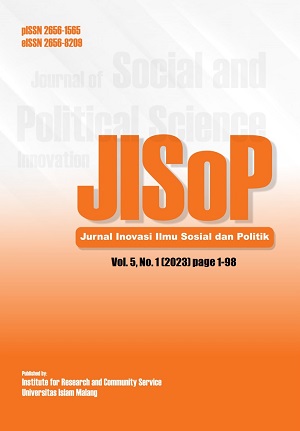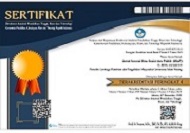The development of cultural event strategy: Swot analysis and QSPM approach
DOI:
https://doi.org/10.33474/jisop.v5i1.20035Keywords:
event tourism, culture tourism, SWOT, QSPMAbstract
n order to support the Banyuwangi Rebound Movement, Pondoknongko Village Government has launched an Economic and Tourism Improvement Program in 2022 through the Pondoknongko Festival Event. The purpose of this research is to: find out the management of the Pondoknongko Festival event; identify potential cultural tourism attractions; identify internal and external factors for the development of cultural tourism events; and determine the priority order of alternative strategies for developing cultural tourism events in Pondoknongko Village. This study used a descriptive research method with a mixed-method approach, exploratory sequential design model. The analysis technique used is Internal External (IE) Matrix, Strengths, Weaknesses, Opportunities, Threats (SWOT) Matrix, and Quantitative Strategic Planning Matrix (QSPM). The results showed that the Pondoknongko Festival Event Management had been well implemented starting from the research stage, design, planning, coordination, to the evaluation stage; Pondoknongko Village has a variety of potential cultural tourism attractions that can be developed and packaged as cultural tourism event activities; the position of the development of cultural tourism events is in cell IV grow and build and 10 alternative strategies have been formulated with a priority strategy that can be applied is to arrange tour packages that are integrated with cultural tourism events in Pondoknongko Village.
References
Anggoro, A. D., Susanto, H., Arifin, R., Nugroho, O. C., Purwati, E., & Ridho, I. N. (2023). Manajemen Event Budaya Sebagai Daya Tarik Wisata di Kabupaten Ponorogo. Jurnal Ilmu Sosial Dan Pendidikan (JISIP), 7(1), 570–580. https://doi.org/10.58258/jisip.v7i1.4434
Arifin, S. (2022). Gerakan Banyuwangi Rebound, Cara Bangkit Bersama di Masa Pandemi. Times Indonesia. https://timesindonesia.co.id/peristiwa-daerah/391043/gerakan-banyuwangi-rebound-cara-bangkit-bersama-di-masa-pandemi
Arlianto, R. H. S., Novianti, E., & Endyana, C. (2020). Peluang Event Pariwisata dalam Mengatasi Unsustainability Tourism di Pantai Kelapa Patimban Pusakanagara Kabupaten Subang. Jurnal Master Pariwisata (JUMPA), 6(2), 375–388. https://doi.org/10.24843/JUMPA.2020.v06.i02.p07
Chen, H., & Rahman, I. (2018). Cultural tourism: An analysis of engagement, cultural contact, memorable tourism experience and destination loyalty. Tourism Management Perspectives, 26, 153–163. https://doi.org/10.1016/j.tmp.2017.10.006
Creswell, J. W. (2012). Educational Research: Planning, Conducting, and Evaluating Quantitative and Qualitative Research (P. A. Smith, C. Robb, M. Buchholtz, J. Sabella, & K. Mason (eds.); 4th ed.). Pearson Education, Inc.
Echeta, D., & Onuchukwu, S. (2022). Impact of Event Tourism on Lagos Residents Image. Journal of Social Responsibility,Tourism and Hospitality, 2(3), 32–41. https://doi.org/10.55529/jsrth.23.32.41
Getz, D. (1991). Festivals, Special Events, and Tourism. Van Nostrand Reinhold.
Goldblatt, J. (2014). Special Events: Creating and Sustaining a New World for Celebration (7th ed.). John Wiley & Sons, Inc.
Gupta, M., Shri, C., & Agrawal, A. (2015). Strategy Formulation for Performance Improvement of Indian Corrugated Industry: An Application of SWOT Analysis and QSPM Matrix. Journal of Applied Packaging Research, 7(3), 60–75. https://scholarworks.rit.edu/japr/vol7/iss3/3/
Herţanu, A., & Boitor, A.-B. (2012). S . T . E . P . Analysis on Event Tourism. Bulletin of the Transilvania University of Braşov, 5(2), 25–30. https://scholarworks.rit.edu/japr/vol7/iss3/3/
Higgins-Desbiolles, F. (2018). Event tourism and event imposition: A critical case study from Kangaroo Island, South Australia. Tourism Management2, 64, 73–86. https://doi.org/10.1016/j.tourman.2017.08.002
Kemenparekraf/Baparekraf RI. (2021). Tren Pariwisata Indonesia di Tengah Pandemi. https://kemenparekraf.go.id/ragam-pariwisata/Tren-Pariwisata-Indonesia-di-Tengah-Pandemi
Ma, L., & Lew, A. A. (2023). Historical and geographical context in festival tourism development. Journal of Heritage Tourism, 7(1), 13–31. https://doi.org/10.1080/1743873X.2011.611595
Mallick, S. K., Rudra, S., & Samanta, R. (2020). Sustainable ecotourism development using SWOT and QSPM approach: A study on Rameswaram, Tamil Nadu. International Journal of Geoheritage and Parks, 8(3), 185–193. https://doi.org/10.1016/j.ijgeop.2020.06.001
Richards, G. (2018). Cultural tourism: A review of recent research and trends. Journal of Hospitality and Tourism Management, 36, 12–21. https://doi.org/10.1016/j.jhtm.2018.03.005
Sukoco, J. B., Kinasih, W., Wangi, M. S., & Haryanto, A. T. (2022). Manajemen Event Pagelaran Kesenian Reog Dalam Mewujudkan Tata Kelola Logistik Bidang Pariwisata Di Kabupaten Ponorogo. Jurnal Ilmiah Wahana Bhakti Praja, 12(2), 76–88. https://doi.org/10.33701/jiwbp.v12i2.2710
Sumiarsih, N. M., Legono, D., & Kodoatie, R. J. (2018). Strategic Sustainable Management for Water Transmission System: A SWOT-QSPM Analysis. Journal of the Civil Engineering Forum, 4(1), 29–40. https://doi.org/10.22146/jcef.30234
Vergori, A. S., & Arima, S. (2020). Cultural and non-cultural tourism: Evidence from Italian experience. Tourism Management, 78, 104058. https://doi.org/10.1016/j.tourman.2019.104058
Wardhani, F. K., & Dini, A. (2020). Strategy Formulation Using SWOT Analysis , SPACE Matrix And QSPM : A Conceptual Framework. International Journal of Innovative Science and Research Technology, 5(5), 1520–1527. www.ijisrt.com
Zulkarnaen, H. O., & Sutopo. (2013). Analisis Strategi Pemasaran Pada UKM Makanan Ringan (Studi Penelitian UKM Snack Barokah di Solo). Diponegoro Journal of Management, 2(3), 1–13. https://ejournal3.undip.ac.id/index.php/djom/article/view/3212
Downloads
Published
How to Cite
Issue
Section
License
Copyright (c) 2023 Muhamad Ari Perdana, Putu Ngurah Rusmawan, Inno Cahyaning Tyas, Ayu Wanda Febrian

This work is licensed under a Creative Commons Attribution-ShareAlike 4.0 International License.
.



_-_Copy.jpg)





